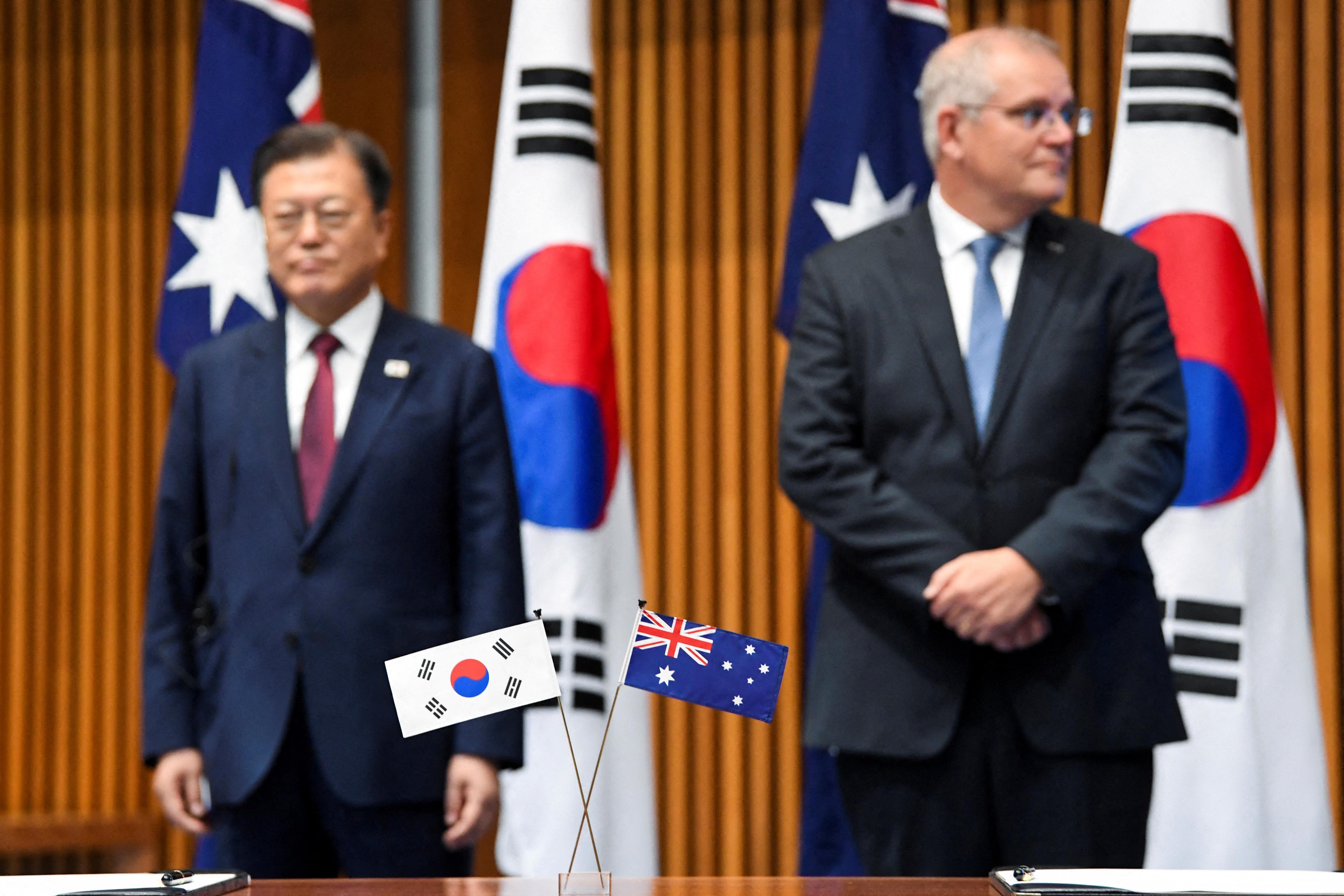News
December 13, 2021
Australia splurges on South Korean weapons. Australia has signed a deal to buy $717 million worth of weapons from South Korea in order to upgrade its military capabilities to counter Chinese aggression in the Indo-Pacific. During a visit to Australia, South Korean President Moon Jae-in said the agreement has “nothing to do with our position over China,” likely an attempt to keep temperatures low in his neck of the woods, particularly as he looks to bridge relations with the North before he leaves office in March. Though the contract with Seoul is modest in size, it’s only the latest recent step taken by Australia to strengthen its military as relations with China continue to deteriorate. Earlier this year, it signed the AUKUS defense pact with the US and UK, which will allow Canberra to build nuclear-powered submarine capabilities, and also plans to buy dozens of American-made Black Hawk helicopters to up its game. Australia is indeed in a pickle: it wants to build a bulwark against China in the Indo-Pacific, while also maintaining good(ish) relations with the economic behemoth, by far its largest trade partner.
Canada threatens US with new tariffs. Canada has threatened to hit the US with retaliatory tariffs if the Biden administration moves ahead with a plan to give tax credits to buyers of US-made electric vehicles, with additional benefits for buying a car with a US-made battery or made at a unionized factory. In a letter to the US Congress, Ottawa also said it would suspend parts of the USMCA, a trade agreement between the US, Canada and Mexico, that are priorities for Washington, including changes to copyright rules. Canada is up in arms because the auto industry is one of its largest manufacturing sectors, contributing more than $12.5 billion to its GDP in 2020. Canada's top trade representative and Deputy PM Chrystia Freeland said they’d prefer to find a compromise, but won’t hesitate to hit the US with payback tariffs like Canada did when the Trump administration placed “unjustified tariffs on Canadian steel and aluminum.” But the White House says that President Biden sees these tax credits as “a personal priority,” making it unlikely that Washington will back down.
“Bullet power” vs “ballot power” in Libya. Libya’s long-hoped-for presidential elections are in jeopardy after the electoral commission missed a deadline to publish a final list of candidates. The UN-backed vote is scheduled for December 24, marking a decade since chaos and factional violence enveloped the nation after the ousting – and killing – of longtime strongman Muammar Qaddafi. For months, the election has been hamstrung by disagreements within Libya over myriad issues, including who should be allowed to run as well as what rules should govern the electoral process. Around 100 candidates have put their hands up to run for president, some of whom have been banned by the courts. For now, Khalifa Haftar, the warlord who leads the Libyan National Army and is backed by Russia and Egypt, is still in the race, as is Abdul Hamid Dbeibah, who leads the UN-backed Government of National Unity. However, Qaddafi’s son Saif was recently disqualified, adding fuel to the already combustible political situation. Meanwhile, the US ambassador to Libya said Monday that stalling elections only embolden external backers like Russia and Turkey, who “prefer bullet power over ballot power.” This is a massive blow for the 3 million Libyans who have already registered to vote.
More For You
- YouTube
Singapore was one of globalization’s biggest beneficiaries. Ian Bremmer looks at whether the city-state can survive in a world where the economic order that drove Singapore's rapid rise starts to unravel.
Most Popular
Think you know what's going on around the world? Here's your chance to prove it.
Igmel Tamayo carries charcoal to sell on the side of a road for use as cooking fuel in homes, after US President Donald Trump vowed to stop Venezuelan oil and money from reaching the island as Cubans brace for worsening fuel shortages amid regular power outages, on the outskirts of Havana, Cuba, on January 12, 2026.
REUTERS/Norlys Perez
Xi Jinping has spent three years gutting his own military leadership. Five of the seven members of the Central Military Commission – China's supreme military authority – have been purged since 2023, all of whom were handpicked by Xi himself back in 2022.
© 2025 GZERO Media. All Rights Reserved | A Eurasia Group media company.
